Module 1 How to learn English 达标测试卷(含答案及听力材料 无听力音频)
文档属性
| 名称 | Module 1 How to learn English 达标测试卷(含答案及听力材料 无听力音频) | 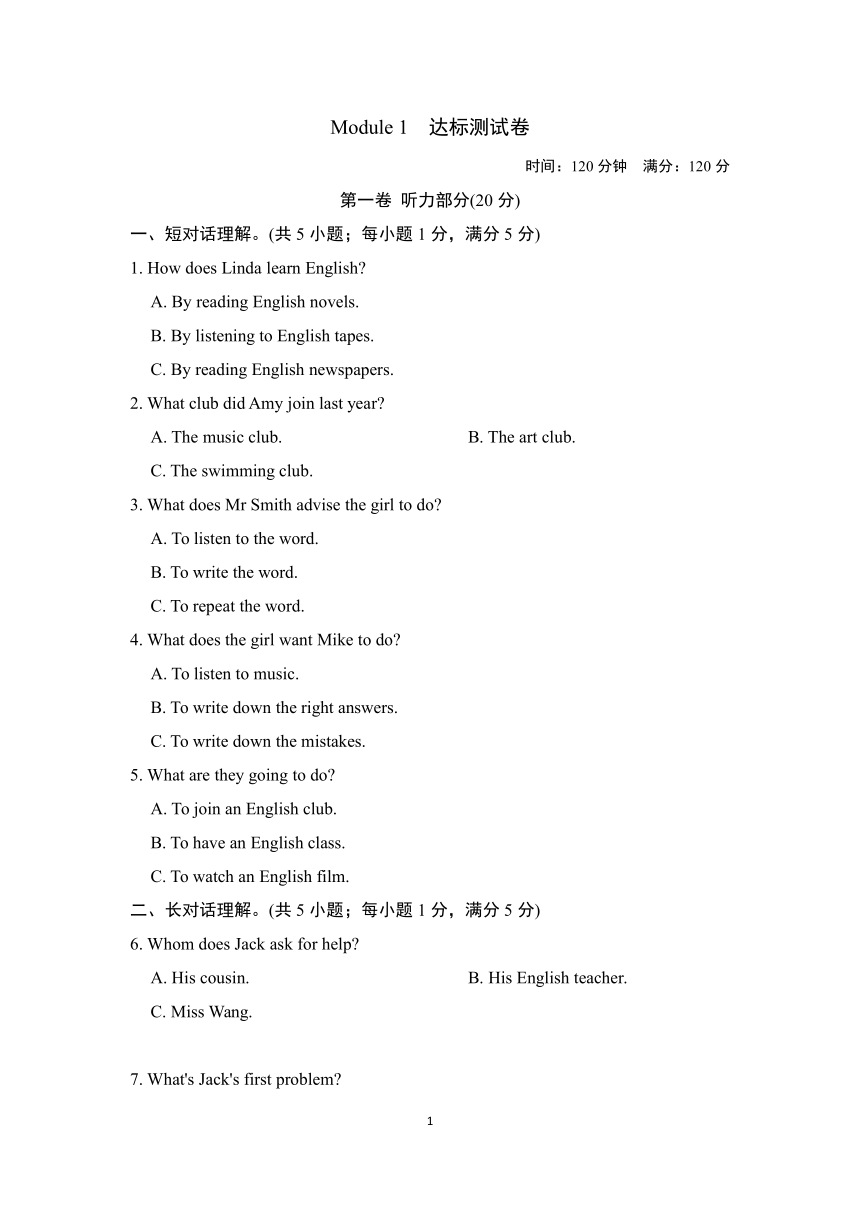 | |
| 格式 | zip | ||
| 文件大小 | 19.6KB | ||
| 资源类型 | 教案 | ||
| 版本资源 | 外研版 | ||
| 科目 | 英语 | ||
| 更新时间 | 2020-05-20 19:39:17 | ||
图片预览

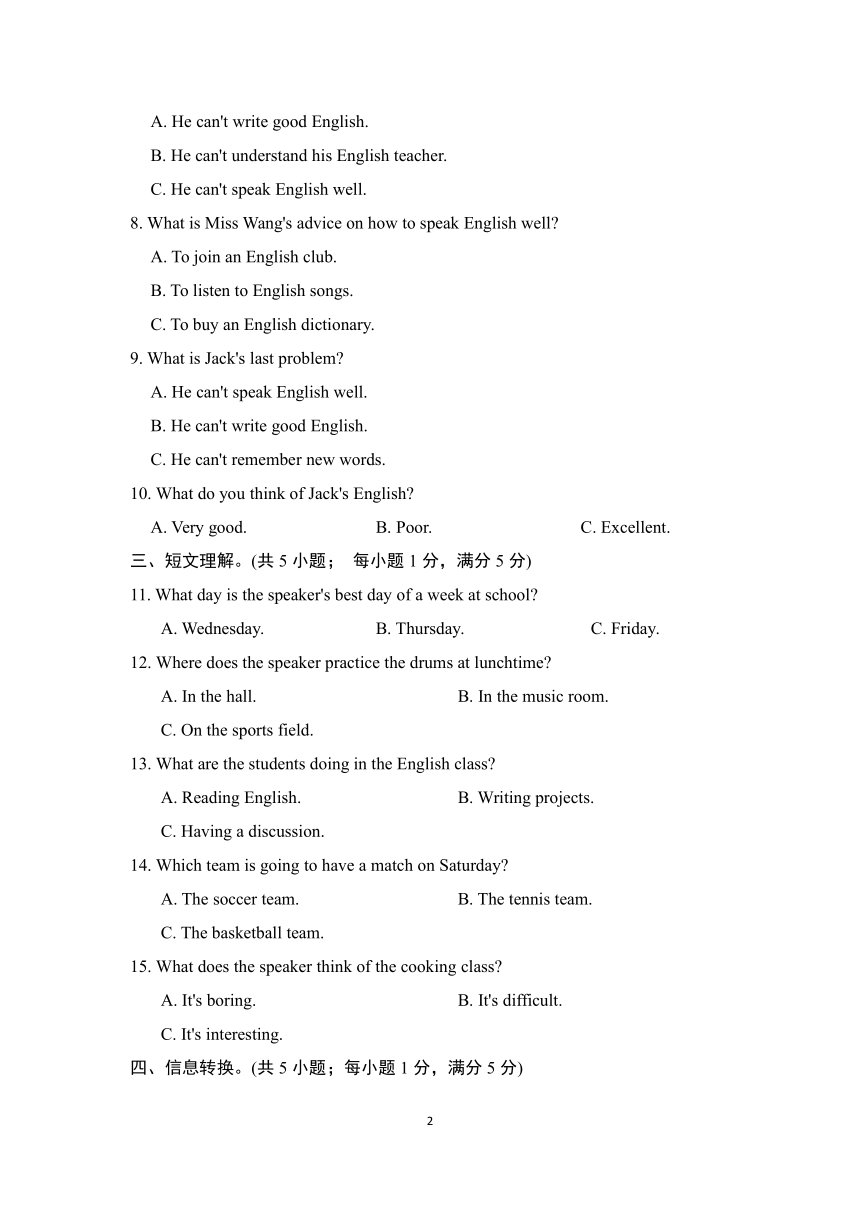
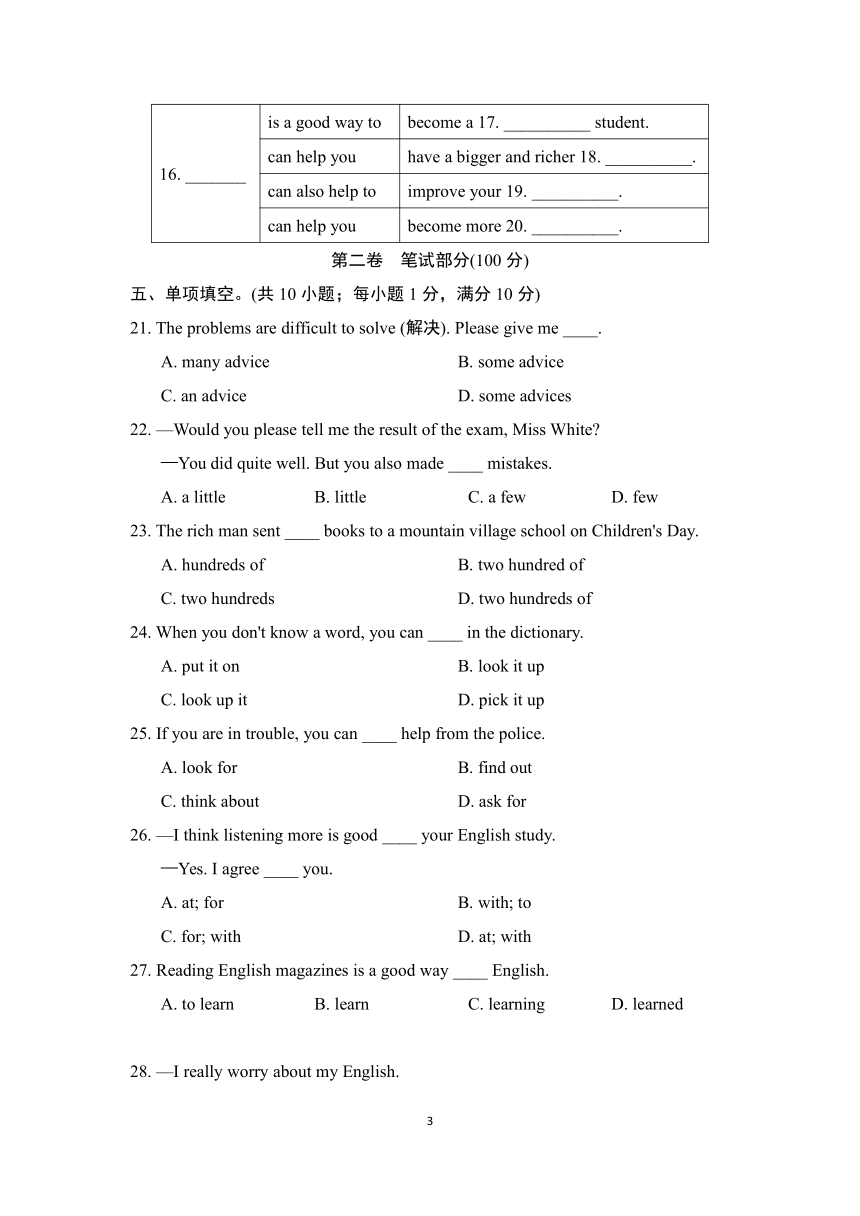
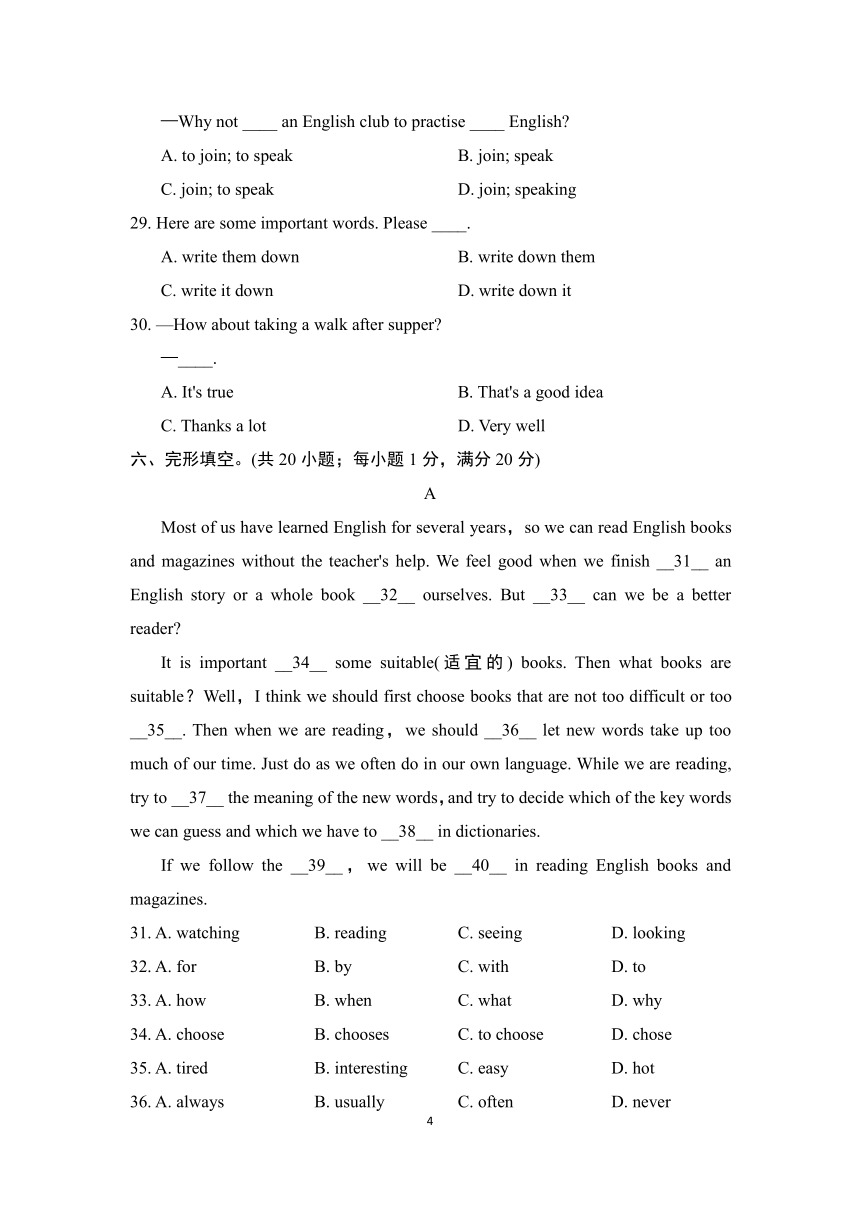
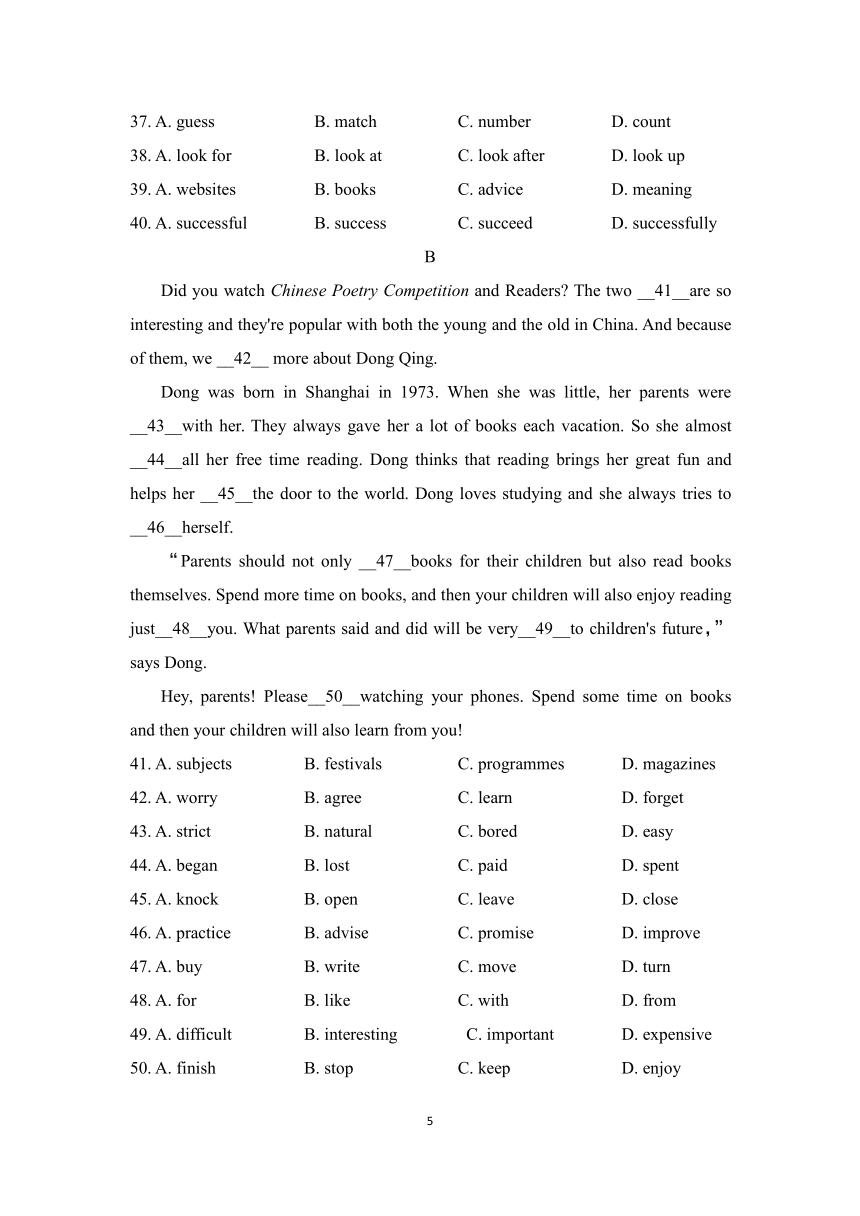
文档简介
Module 1 达标测试卷
时间:120分钟 满分:120分
第一卷 听力部分(20分)
一、短对话理解。(共5小题;每小题1分,满分5分)
1. How does Linda learn English?
A. By reading English novels.
B. By listening to English tapes.
C. By reading English newspapers.
2. What club did Amy join last year?
A. The music club. B. The art club.
C. The swimming club.
3. What does Mr Smith advise the girl to do?
A. To listen to the word.
B. To write the word.
C. To repeat the word.
4. What does the girl want Mike to do?
A. To listen to music.
B. To write down the right answers.
C. To write down the mistakes.
5. What are they going to do?
A. To join an English club.
B. To have an English class.
C. To watch an English film.
二、长对话理解。(共5小题;每小题1分,满分5分)
6. Whom does Jack ask for help?
A. His cousin. B. His English teacher.
C. Miss Wang.
7. What's Jack's first problem?
A. He can't write good English.
B. He can't understand his English teacher.
C. He can't speak English well.
8. What is Miss Wang's advice on how to speak English well?
A. To join an English club.
B. To listen to English songs.
C. To buy an English dictionary.
9. What is Jack's last problem?
A. He can't speak English well.
B. He can't write good English.
C. He can't remember new words.
10. What do you think of Jack's English?
A. Very good. B. Poor. C. Excellent.
三、短文理解。(共5小题; 每小题1分,满分5分)
11. What day is the speaker's best day of a week at school?
A. Wednesday. B. Thursday. C. Friday.
12. Where does the speaker practice the drums at lunchtime?
A. In the hall. B. In the music room.
C. On the sports field.
13. What are the students doing in the English class?
A. Reading English. B. Writing projects.
C. Having a discussion.
14. Which team is going to have a match on Saturday?
A. The soccer team. B. The tennis team.
C. The basketball team.
15. What does the speaker think of the cooking class?
A. It's boring. B. It's difficult.
C. It's interesting.
四、信息转换。(共5小题;每小题1分,满分5分)
16. _______ is a good way to become a 17. __________ student.
can help you have a bigger and richer 18. __________.
can also help to improve your 19. __________.
can help you become more 20. __________.
第二卷 笔试部分(100分)
五、单项填空。(共10小题;每小题1分,满分10分)
21. The problems are difficult to solve (解决). Please give me ____.
A. many advice B. some advice
C. an advice D. some advices
22. —Would you please tell me the result of the exam, Miss White?
—You did quite well. But you also made ____ mistakes.
A. a little B. little C. a few D. few
23. The rich man sent ____ books to a mountain village school on Children's Day.
A. hundreds of B. two hundred of
C. two hundreds D. two hundreds of
24. When you don't know a word, you can ____ in the dictionary.
A. put it on B. look it up
C. look up it D. pick it up
25. If you are in trouble, you can ____ help from the police.
A. look for B. find out
C. think about D. ask for
26. —I think listening more is good ____ your English study.
—Yes. I agree ____ you.
A. at; for B. with; to
C. for; with D. at; with
27. Reading English magazines is a good way ____ English.
A. to learn B. learn C. learning D. learned
28. —I really worry about my English.
—Why not ____ an English club to practise ____ English?
A. to join; to speak B. join; speak
C. join; to speak D. join; speaking
29. Here are some important words. Please ____.
A. write them down B. write down them
C. write it down D. write down it
30. —How about taking a walk after supper?
—____.
A. It's true B. That's a good idea
C. Thanks a lot D. Very well
六、完形填空。(共20小题;每小题1分,满分20分)
A
Most of us have learned English for several years,so we can read English books and magazines without the teacher's help. We feel good when we finish __31__ an English story or a whole book __32__ ourselves. But __33__ can we be a better reader?
It is important __34__ some suitable(适宜的) books. Then what books are suitable?Well,I think we should first choose books that are not too difficult or too __35__. Then when we are reading,we should __36__ let new words take up too much of our time. Just do as we often do in our own language. While we are reading, try to __37__ the meaning of the new words,and try to decide which of the key words we can guess and which we have to __38__ in dictionaries.
If we follow the __39__,we will be __40__ in reading English books and magazines.
31. A. watching B. reading C. seeing D. looking
32. A. for B. by C. with D. to
33. A. how B. when C. what D. why
34. A. choose B. chooses C. to choose D. chose
35. A. tired B. interesting C. easy D. hot
36. A. always B. usually C. often D. never
37. A. guess B. match C. number D. count
38. A. look for B. look at C. look after D. look up
39. A. websites B. books C. advice D. meaning
40. A. successful B. success C. succeed D. successfully
B
Did you watch Chinese Poetry Competition and Readers? The two __41__are so interesting and they're popular with both the young and the old in China. And because of them, we __42__ more about Dong Qing.
Dong was born in Shanghai in 1973. When she was little, her parents were __43__with her. They always gave her a lot of books each vacation. So she almost __44__all her free time reading. Dong thinks that reading brings her great fun and helps her __45__the door to the world. Dong loves studying and she always tries to __46__herself.
“Parents should not only __47__books for their children but also read books themselves. Spend more time on books, and then your children will also enjoy reading just__48__you. What parents said and did will be very__49__to children's future,” says Dong.
Hey, parents! Please__50__watching your phones. Spend some time on books and then your children will also learn from you!
41. A. subjects B. festivals C. programmes D. magazines
42. A. worry B. agree C. learn D. forget
43. A. strict B. natural C. bored D. easy
44. A. began B. lost C. paid D. spent
45. A. knock B. open C. leave D. close
46. A. practice B. advise C. promise D. improve
47. A. buy B. write C. move D. turn
48. A. for B. like C. with D. from
49. A. difficult B. interesting C. important D. expensive
50. A. finish B. stop C. keep D. enjoy
七、补全对话。(有两项多余)(共5小题;每小题1分,满分5分)
A:Henry,I'm poor at English. Can you give me some advice on how to learn English well?
B:OK. 51. ________
A:But I'm afraid of speaking English in front of the class.
B:52. ________ And you should speak English every day.
A:OK. But I often make some mistakes when I do some exercises.
B:53. ________ And you can also ask your teacher for help.
A:That's a good idea. 54. ________
B:I think writing is also very important. You can write to your penfriend in English.
A:55. ________ Thanks a lot.
A. OK. I will do as you tell me. B. What else? C. How can I do that? D. You can write the mistakes down in your notebook. E. Don't be afraid. F. Can you help me do it? G. I think you should speak English in class.
八、阅读理解。(共20小题;每小题2分,满分40分)
A
Here are some English study skills(技能) for beginners.
★Listening
Listening is a great way to improve your pronunciation and intonation(语调). You can start by listening to short stories for children because they are usually easy.
★Reading
Reading is a good way to help you learn new words. And it will also help you learn English grammar. Children's books are great for beginners.
★Vocabulary
When you come across new words in the reading,write them down in your notebook. You can write down the translation in your native language to help you understand.
★Speaking
While doing your reading exercises,read them aloud. You can also look for some articles(文章) on the Internet to read.
Learning any language needs practice—lots of practice. You don't have to spend hours studying each day. Just 30 minutes a day and four or five days a week will help you improve it.
56. How can we improve our English pronunciation?
A. By listening. B. By watching TV.
C. By writing. D. By learning grammar.
57. How do beginners learn new words according to the passage?
A. Remember the words in the dictionary.
B. Write down the new words they meet in the reading.
C. Look for new words on the Internet.
D. Read the new words many times a day.
58. What does the underlined word “translation” mean in Chinese?
A. 翻译 B. 发音 C. 位置 D. 次数
59. What's the best title (标题) for the passage?
A. How to improve English reading
B. Ways to study English grammar
C. English is important
D. English study skills for beginners
B
English is one of the most important subjects in our studies, and there are many ways for us to learn it well. But I think it is not easy to do so. We must try our best.
Everyone wants to remember all the vocabulary. We also want to use them correctly. Of course, we can't expect to do this in a few months. We must read and write every day. We must study grammar. And we must practise more. The more you speak, the better your English will become.
Everyone can make mistakes when speaking. We should keep humorous when someone laughs at our mistakes. What we can do is just to speak more. As the old saying goes, “Practice makes perfect. ”
Keep trying and working hard to improve your English. Because I believe where there is a will, there is a way.
60. Which of the following is TRUE?
A. English is one of the most important subjects in our studies.
B. English is too difficult to learn.
C. English is not important.
D. We can remember all the new words and expressions in a few months.
61. To learn English well, we must____.
A. remember all the vocabulary
B. read and write every day
C. study grammar and practise more
D. all of the above
62. What should you do when someone laughs at your mistakes?
A. We should get angry.
B. We should keep humorous.
C. We should get excited.
D. We should get happy.
63. The main idea of this passage is that ____.
A. English is important and we should work hard on it
B. we can't expect to learn English well
C. you needn't worry when you make some mistakes
D. the more you speak,the fewer mistakes you will make
C
You may know all learning skills, but if you don't start doing things, you will never learn them well. If you want to learn to speak English well, you must change your present(现在的) life. Here are some things you have to do.
★Read a book in English for an hour every day, study the grammar in sentences and look up new words in an English?Chinese dictionary.
★Listen to recordings(录音)in English, stop it frequently(经常地), try to understand what they are saying, and try to learn the speakers' pronunciation.
★Write an email in English carefully and use a dictionary to make sure(确保) every word is correct. Talk to yourself in English about the things you see around you when you walk down the street.
What kind of person would do all these things? Only one kind—a person who enjoys doing them.
64. To speak English well, ____.
A. we must know all learning skills
B. it is no use knowing the learning skills
C. we must take action(行动)
D. we must get up early every day
65. What does the underlined word “skills” mean in Chinese?
A. 熟练 B. 材料 C. 技能 D. 地点
66. When we listen to recordings in English, we should stop it frequently to ____.
A. make sure we understand what we hear
B. try to learn the pronunciation
C. have a short rest
D. both A and B
67. If we walk down the street, we should ____ according to the passage(根据短文).
A. talk to anyone we meet in English
B. talk to ourselves about the things we see around us in English
C. listen to others carefully
D. say anything we see around us to others in English
D
I'm Molly, from Argentina. I started learning English when I was eight. It was 6 years ago. A friend of mine, Jose, was going to take English classes and she didn't want to go alone. My mother, a doctor, asked me to go with her. I thought it was a good idea. After I started, I never stopped. English is fun. I want to be an English teacher one day.
It is not easy to learn English. A lot of people think that you have to start learning it at a very early age. I don't think that's true. You can learn it at any age. You need to practise, practise and practise. You can't just go to class, listen to the teachers, and do things that they ask you to do. That's not enough (足够的). You must practise a lot and use it.
I also think exposing yourself to(使自己接触到) everyday language is very important. There's so much different content on the Internet and you can find whatever you like. If you like movies, if you like sports, if you like music, if you like talk shows…you can find anything that you are interested in. Listen to everyday English and try to understand everyday English.
I think practice and exposure are two good ways of learning English. So why not try them right now?
68. What does Molly think of learning English?
A. Fun and easy. B. Fun but hard.
C. Boring but easy. D. Boring and hard.
69. What does Molly want to be in the future?
A. A doctor. B. A worker.
C. An English teacher. D. An English doctor.
70. Which of the following is Molly's opinion (观点) on English learning?
A. One can learn English alone.
B. One can learn English at any age.
C. One must practise English every day.
D. One must find a good English teacher.
71. What does the underlined word “content” in Paragraph 3 mean in Chinese?
A. 描述 B. 观点 C. 文化 D. 内容
72. In this passage Molly wants to tell us____.
A. how to learn English
B. why to learn English
C. when to learn English
D. where to learn English
阅读下面的短文,并用英语回答问题(请注意每小题后面的词数要求)。
E
Amy was excited all summer long. She was going to school for the first time. Her mother bought her a new red schoolbag, some pencils, erasers, notebooks and other school things. Her mother bought so much and Amy wanted to know how she would take it all!
Then, when it was time to go to school, Amy felt afraid. “What if (要是……会怎么样) other children will not play with me?” she thought. Amy was also afraid the teacher would ask her things she didn't know. Amy's mother said, “All the children have feelings like this when they go to school for the first time. ”
“When you go to school, you will really like it. You will meet lots of new friends and learn many new things,” her mother told her.
“When you get to school, find someone who looks afraid, and try to help him or her to feel better,” her mother also said “You will feel happy because you helped someone. ”
This is just what Amy did. When she arrived at school, she looked around and found another little girl who looked afraid. Her name was Sally and they soon became friends. Amy found out that she loved school. She loved her teacher, her new friend and she loved to learn new things!
73. What did Amy's mother buy before school started? (不超过10个词)
_________________________________________________________________
74. How did Amy feel when it was time for school? (不超过5个词)
_________________________________________________________________
75. What did Amy's mother ask her to do when she was at school? (不超过15个词)
_________________________________________________________________
九、 单词拼写。(共5小题;每小题1分,满分5分)
76. Please tell me the m (含义)of this word.
77. Listening is Tom's m (主要的)problem in learning English.
78. It's difficult to start a c (谈话) in English.
79. Mr Green is a very e (优秀的)teacher in his school.
80. The doctor s (建议)that Mary have a good rest.
十、书面表达。(共1小题;满分20分)
假如你是来自美国的语言博士爱丽丝(Alice),你收到一个来自中国的中学生大明(Daming)给你写来的信,向你寻求学习英语的方法,请根据所给提示给大明用英语写一封回信,给他提一些建议。
提示:1. 看英文电影和电视节目;
2. 参加英语社团;
3. 去说英语的国家旅游。
注意:1. 词数80~100;
2. 可适当增加细节,以使行文连贯;
3. 开头已给出,不计入总词数。
Dear Daming,
You should watch films and TV programmes in English. __________________
_____________________________________________________________________
_____________________________________________________________________
_____________________________________________________________________
_____________________________________________________________________
Yours,
Alice
参考答案
第一卷 听力部分
听力材料:
一、1. M:How do you learn English,Linda?
W:I like reading English newspapers.
2. M:What club did you join last year,Amy?
W:I joined the swimming club.
3. W:Mr Smith, how can I remember the word “repeat”?
M:By repeating it again and again.
4. W:How about writing down your mistakes in your notebook,Mike?
M:OK, and what else?
5. W:Let's watch an English film this afternoon.
M:That sounds great.
二、M:Miss Wang, I have some problems with my English. Can you help me?
W:Of course. What are your problems,Jack?
M:First, I can't understand my English teacher when she talks to the class.
W:Don't worry. You should listen to English tapes as much as you can.
M:OK,I'll try it. Besides,I can't speak English well.
W:Why not join an English club?It will help you a lot.
M:Good idea. I'll try it. By the way, I write down new words, but I forget them quickly. How can I remember them?
W:Don't worry. It's natural to forget new words! You should remember four or five words a day and try to use them.
M:Thank you very much. I will try my best to do that.
三、 M:It's only my third week at my new school and I love it!Today is Friday—the best day of a week at Central High School.
Why? My first class is music. I'm learning to play the drums this year and I love it! I practice at lunchtime every day in the music room.
Then we have math. We do a test every Friday. After math we have English. I'm in English class now. Everybody is writing their project— A Day at Central High School. On the sports field, the soccer team is training for the match on Saturday.
Friday afternoons are great because we can choose our courses. This term I'm doing food technology. We have great fun. We make some fantastic cakes and biscuits! Who says cooking is just for girls?
四、 Reading is a good way to become a better student. You can learn a large number of new words from reading. This can help you have a bigger and richer vocabulary. And you will meet many new words that you do not often use in daily life. Reading also helps to improve your writing because new words can be used in your compositions. Another good reason for reading books is that the story can take your mind to new places and help you become more open?minded. So, why not read more books?
听力答案:
一、1~5:CCCCC 二、6~10:CBACB
三、11~15:CBBAC
四、16. Reading 17. better 18. vocabulary
19. writing 20. open?minded
第二卷 笔试部分
五、21. B 点拨:advice意为“建议”,为不可数名词,无复数形式,其前不能用many修饰,但可以用some或a lot of修饰。故选B。 22. C 23. A
24. B 点拨:put on意为“穿上”; look up“查找”; pick up“拾起,捡起”。根据句意“当你不认识一个单词时,你可以在词典里查找一下它。”可知,用look up。look up是动词+副词的结构,作宾语的是代词,要放在look与up之间。故选B。
25. D
26. C 点拨:固定用法:be good for意为“对……有好处”; be good at意为“擅长……”; agree with sb. 意为“同意某人的看法”。故选C。
27. A 点拨:a way to do sth 做某事的一个方法,故选A。
28. D 点拨:固定用法:Why not +动词原形+其他?意为“为什么不……?”; practise doing sth. 意为“练习做某事”。故选D。
29. A 点拨:write down是动词+副词结构的短语, 代词作宾语,放中间。且words为复数,故选A。 30. B
六、A) 31~35:BBACC 36~40:DADCA
B) 41~45:CCADB 46~50:DABCB
七、51~55:GEDBA
八、A)56~59:ABAD B) 60~63:ADBA
C) 64~67:CCDB D) 68~72:BCBDA
E)73. A schoolbag, some pencils, erasers, notebooks and other school things.
74. Amy felt afraid.
75. Try to help someone who looks afraid to feel better.
九、76. meaning 77. main 78. conversation 79. excellent
80. suggested
十、One possible version:
Dear Daming,
You should watch films and TV programmes in English. You can guess the meaning of the new words. Each time you'll learn something new. You should join an English club. It's a good idea to practise your spoken English. Why not go to an English?speaking country for your summer holiday? In the way, you can improve your listening and speaking. Study hard and you will improve your English one day.
Yours,
Alice
同课章节目录
- Module 1 How to learn English
- Unit 1 Let's try to speak English as much as possi
- Unit 2 You should smile at her.
- Unit 3 Language in use .
- Module 2 My home town and my country
- Unit 1 It's taller than many other buildings.
- Unit 2 Cambridge is a beautiful city in the east o
- Unit 3 Language in use .
- Module 3 Sports.
- Unit 1 Nothing is more exciting than playing tenni
- Unit 2 This year we training more carefully.
- Unit 3 Language in use .
- Module 4 Planes, ships and trains .
- Unit 1 He lives the farthest from school.
- Unit 2 What is the best way to travel.
- Unit 3 Language in use .
- Module 5 Lao She Teahouse.
- Unit 1 I wanted to see the Beijing Opera.
- Unit 2 It descibes the changes in Chinese society.
- Unit 3 Language in use .
- Module 6 Animals in danger.
- Unit 1 It allows people to get closer to them .
- Unit 2 The WWF is working hard to save them all.
- Unit 3 Language in use .
- Revision module A
- Module 7 A famous story
- Unit 1 Alice was sitting with her sister by the ri
- Unit 2 She was thinking about her cat.
- Unit 3 Language in use .
- Module 8 Accidents
- Unit 1 While the car were changing to red, a car s
- Unit 2 I was trying to pick it up when it bite me
- Unit 3 Language in use .
- Module 9 Population
- Unit 1 The population of China is about 1.37 billi
- Unit 2 Arnwick was a city with 200,000 people.
- Unit 3 Language in use .
- Module 10 The weathe
- Unit 1 It might snow.
- Unit 2 The weather is fine all year round.
- Unit 3 Language in use .
- Module 11 Way of life
- Unit 1 In China ,we open a gift later.
- Unit 2 In England, you usually drink tea with milk
- Unit 3 Language in use .
- Module 12 Help
- Unit 1 What should we do before help arrives?
- Unit 2 Stay away from windows and heavy furniture.
- Unit 3 Language in use .
- Revision module B
